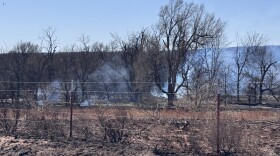Johana Linares regularly voted when she lived in Venezuela. And she continued to vote in her home country’s elections after moving to the U.S.
But when the U.S. and Venezuela broke diplomatic relations in 2019, the consulates and embassies in the States closed, leaving Linares and many other Venezuelans unable to vote.
“Having lost this right makes me appreciate [voting] even more,” said Linares, who’s lived in the U.S. for 14 years, seven of those as a permanent resident.
A few days ago, she and her husband voted in their first U.S. election. Earlier this year, they both became U.S. citizens.
“I think that every vote counts for president or for school board,” said Linares, who works as a dual language coordinator for the Dallas Independent School District. “The only valid way to express our desires or our feeling about any important topic is through voting.”
According to the Pew Research Center, the number of naturalized citizens eligible to vote in U.S. elections is growing. Today, one in 10 eligible voters are naturalized citizens. Most of them, or 73%, have lived in the U.S. for more than two decades.
And as political unrest rises in places like the Middle East and Latin America, new U.S. citizens The Texas Newsroom spoke to say they have a greater incentive to vote in their local elections. They see it as a civic duty that they are both excited and anxious about. None of them revealed who they voted for, but they shared what issues weighed heavily on their minds.

Linares’ husband, Jose Antonio Padilla, said he wanted his voice heard.
“Voting was essential to me because I see political chaos in the U.S., and my perspective is different,” said Padilla, who’s originally from Spain but lived in Venezuela before moving to the U.S. “I believe united citizens can accomplish much more.”
The most important issues, he said, are political radicalization and polarization and the “aggressiveness toward immigrants, whether legal or undocumented.”
“This country was built by immigrants and continues to be shaped by them, so it’s hard to understand this hostility,” Padilla said.
Abida Anwar of Frisco is originally from Pakistan. She arrived in the U.S. on a student visa 24 years ago to attend grad school. Afterward, she moved to Canada and traveled around the world. Seven years ago, she moved back to the U.S. to be closer to family.
On August 19, her 49th birthday, she took the oath to become a U.S. citizen. It was like “having two parties on the same day” with 600 individuals also being sworn in.
It wasn’t lost on her that some of the immigrants who sat around her had waited a long time to become citizens. One woman sitting close by had waited 20 years.
“It’s a very overwhelming experience,” Anwar said. “Becoming a citizen of a country and being able to vote and influence global affairs is both a responsibility and a privilege.”
Anwar said picking a presidential candidate this year was one of the most difficult decisions she’s ever had to make. The war in Gaza and Lebanon is constantly on her mind.
“Being a Muslim, the biggest issue is the issue in the Middle East,” she said. “I think anybody who’s a human can see the suffering and the killings that are happening there. It just breaks my heart. It’s very hard to see those images coming out of there that why isn’t anybody doing anything about it?”
Anwar said she hoped whoever is elected president will take the time to listen to different viewpoints and people of different backgrounds as well as try to find some common ground.
McKinney residents Zaid Ally and Arshia Ali are from Montreal, Canada, they were born to immigrant parents. Arshia’s parents immigrated to Canada from Pakistan, and Zaid’s parents are from Guyana, which sits on South America’s northern coast.
The couple moved to the U.S. 16 years ago and have two kids. Arshia Ali said becoming U.S. citizens provided stability, ensuring that they wouldn’t have problems if a future administration changed immigration laws.
“I don’t think 20, 30 years ago you would even fathom not letting immigrants in or feel empowered to kick people out,” Zaid Ally said. “You can’t voice your opinion as an immigrant as strongly as you can as a citizen. Just the simple right to vote says it all. And we felt that this upcoming election is an important one.”
Like other voter newbies, going to the polling center for the first time, during early voting this year, felt a bit daunting.
“To be honest, I didn’t know what to do,” Arshia Ali said. “I was like, I’m just going to follow the line. I was standing in the wrong place … I think you could tell we didn’t know what we were doing.”
The process of voting was also different than when she last voted, in Canada. There, she voted on a paper ballot. Here, it was a touchscreen.
“We were told after that we should have said that we were first time voters,” Zaid Ally said. “So that . . . they could clap or whatever.”
Got a tip? Email Stella M. Chávez at schavez@kera.org. You can follow Stella on Twitter @stellamchavez.
KERA News is made possible through the generosity of our members. If you find this reporting valuable, consider making a tax-deductible gift today. Thank you.
Copyright 2024 KERA







